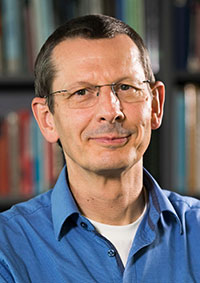05-BMG-GI3 Earth-System Modeling and Data Analysis
Representative Michael Schulz
Numerical models are widely used across all fields in Earth Sciences. This course introduces the basic concept of finite difference techniques for solving differential equations. The focus is on reservoir models that are applied, for example, in geochemistry, paleoceanography, or climatology. Computer labs using Python form the core of the course. In the second part, the students learn about the analysis of climate data stemming from 4-dimensional observations or climate models, i.e., gridded data in time and space.
understanding key concepts and assumptions underlying numerical models
basic understanding of discretization in space and time using finite differences
ability to transfer modeling concept to simple geoscientific problems
ability to analyse 4-dimensional climate data
Fundamentals of mathematics, physics and chemistry
Course Type 1: block course (BK) 2.0 SWS ( 28.0 h)
Course Type 2: Lecture, Exercise (L+E) 2.0 SWS ( 28.0 h)
Tutorial(s): -
Workload:56.0 h presence time
56.0 h self-study
68.0 h exam workload
180 h total workload
module exam
exam elements: 1
SL: 0
100 % written exam
Kendal McGuffie, Ann Henderson-Sellers: The Climate Modelling Primer, 4th Edition. Wiley-Blackwell, 456 pp., 2014.
Hartmann, Dennis L.: Global Physical Climatology. Elsevier, 2nd edition, 498 pp., 2016.
Basic Data
Bachelor Marine Geosciences
Module Type
Compulsory
3. Year of Study
Offering Departement
FB5 Geosciences
Sommersemester
Course LanguageGerman and English
6 CP
4 SWS
Contact

Contact
Prof. Dr. Michael Schulz
MARUM ZfT 4270
 marum.de
marum.deContact

Contact
Prof. Dr. Michael Schulz
MARUM ZfT 4270
 marum.de
marum.de
